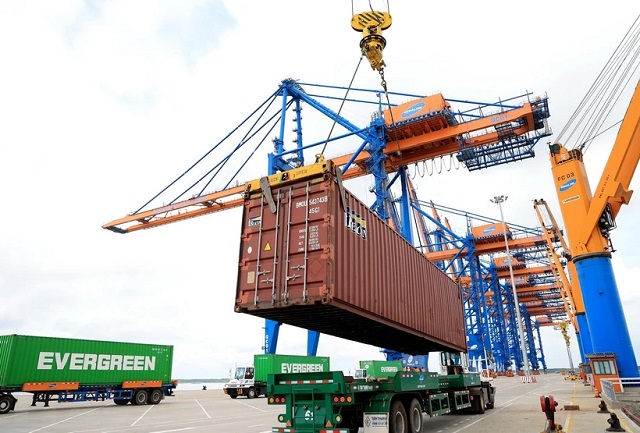
Unloading containers at Cai Mep port cluster, Phu My town (Ba Ria-Vung Tau). (Photo: Hong Dat/TTXVN)
|
The Banker (UK) quotes experts’ opinions on the optimistic prospects for Vietnam’s economic growth in 2024.
In 2024, Vietnam’s GDP growth is forecasted to reach 6-6.5%, making Vietnam one of the fastest-growing environments in Southeast Asia.
According to Khánh Vũ, Deputy CEO of VinaCapital, this growth will be driven by growth factors across all sectors of the economy – from exports, manufacturing, tourism to domestic consumption and consumer sentiment.
Public sector wages will increase from mid-year, which is a reason why domestic spending in 2024 will be stronger than in 2023.
Economic growth is also supported by favorable interest rate conditions. According to Mr. Vũ, the encouraging thing is that companies currently borrow to fund working capital and capital expenditure.
A year ago, businesses had to borrow at interest rates of 9-10%, but now they can borrow at interest rates of 5-7%. Deposit interest rates are declining faster than lending rates, so lending rates are likely to decline even further.
Economist Helmi Arman at Citi, a multinational financial services company headquartered in Manhattan (USA), said that after freezing at the beginning of 2023, real estate activities in Vietnam recovered in the second half of the year.
The government is pushing for structural reforms to lay the foundation for more sustainable recovery in the real estate sector. However, this will not happen overnight.
The revised Land Law, recently passed into law, will take effect by 2025.
For international investors, Vietnam’s manufacturing sector remains the most attractive, especially the supply chain of smartphones and consumer electronics.
For domestic investors, exports of textiles, footwear, and furniture are receiving the most attention.
The trend of many companies relocating their manufacturing activities to Vietnam has brought benefits. In the pursuit of semiconductor production, the Vietnamese government has a strategy to expand the scale of the entire supply chain by increasing the capacity of semiconductor testing and packaging.
The strength of the manufacturing sector is having a positive impact on the export stream. Economic experts Khánh Vũ and Kenglin Tan, Senior Investment Portfolio Manager at Manulife Investment Management, are both optimistic about some signs of stability in Vietnam’s exports.
There were concerns that Vietnam’s decision to apply a “global minimum tax” rate would affect investment flows, but this has not happened.
According to Kenglin Tan, from the perspective of foreign investors, whether investing in Vietnam or other countries under agreements such as Mexico or Thailand, they are all affected by similar policies.
Foreign direct investment (FDI) in December 2023 showed that investors were not hindered.
Interest in FDI is also increasing. South Korea has set a target to exceed $100 billion in total investment capital by 2025.
So far, the country has invested $84 billion in Vietnam, focusing on manufacturing, with $62 billion invested in over 4,600 projects, including major manufacturers such as Samsung, LG, and SK.
One major project benefiting from FDI is Long Thanh International Airport. FDI for this project comes from the US, Japan, France, Turkey, and the Netherlands.
To continue developing the potential for international investment, Vietnam is opening up the stock market by allowing domestic brokers to guarantee foreign investors, allowing them to buy shares.
According to economist Arman, allowing higher foreign ownership can minimize future shocks. Foreign ownership limits are a concern when it comes to attracting investment in Vietnam’s capital markets.
Vietnam also needs to strengthen the capitalization of the banking sector if it wants to better absorb the impact of economic downturns in the future and maintain sustainable growth.
In the tourism sector, the number of tourists coming to Vietnam has recovered to 70% of pre-COVID-19 levels. Notably, domestic tourism is booming. The outlook for tourism is optimistic.
According to a report from Vietnam Report Joint Stock Company, 66% of people surveyed in the tourism and hotel industry expressed confidence in 2024.
Among those surveyed, 93% said the new visa regulations would be a lever for the country’s tourism development trajectory./.
Minh Hop












